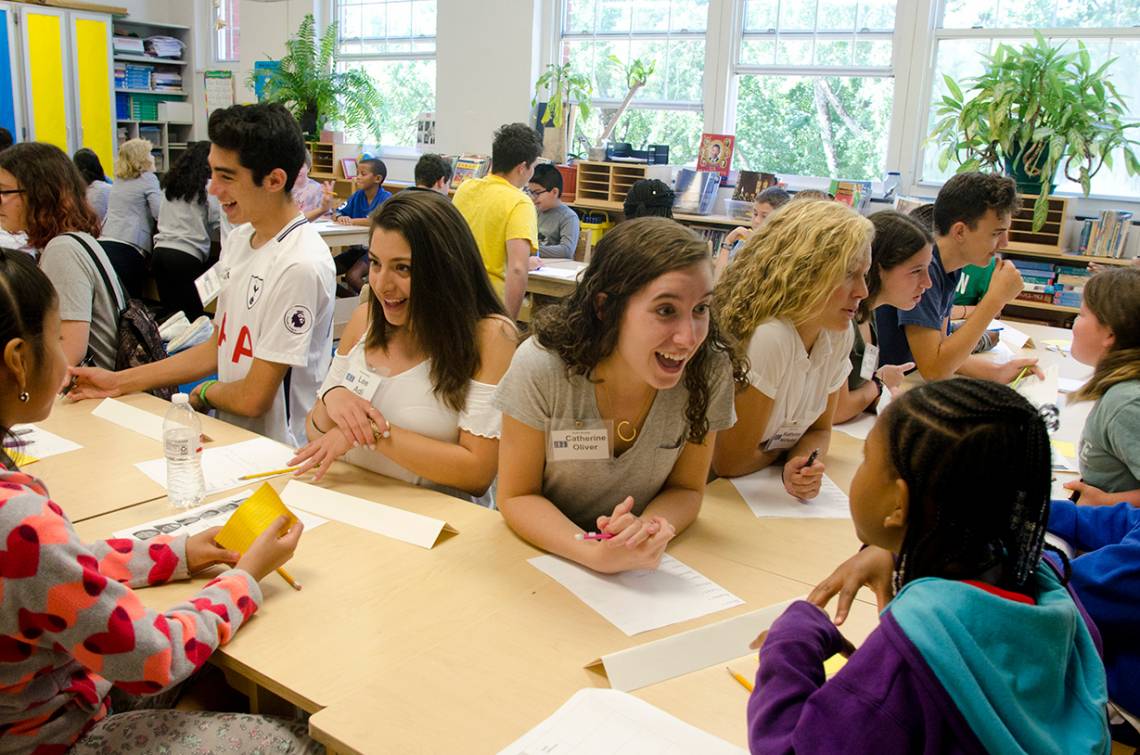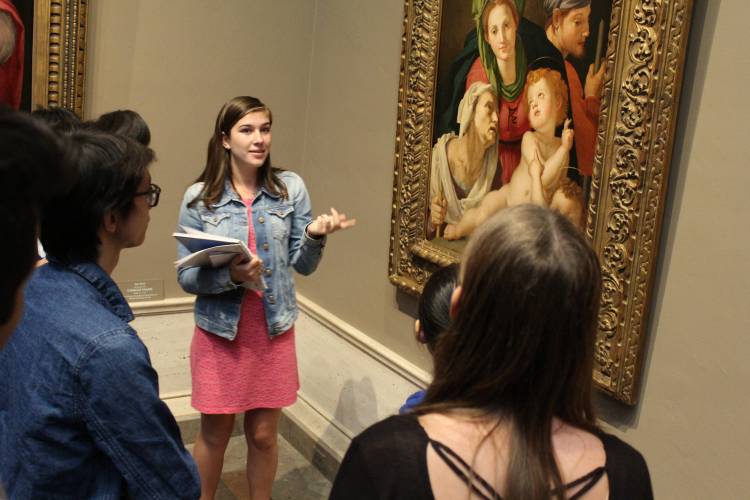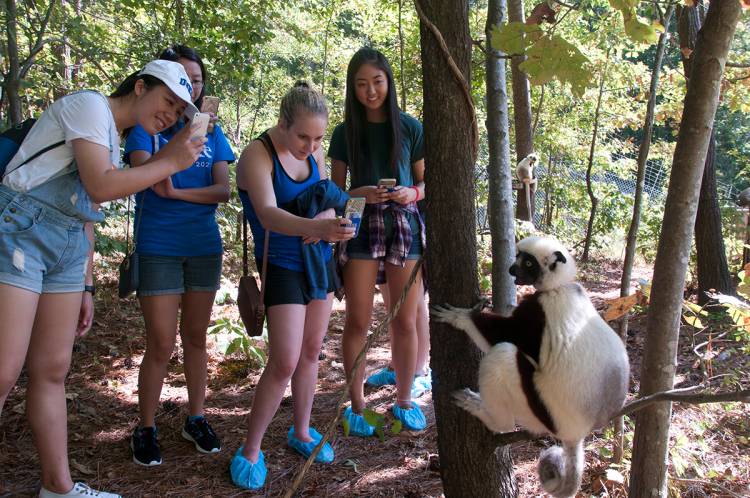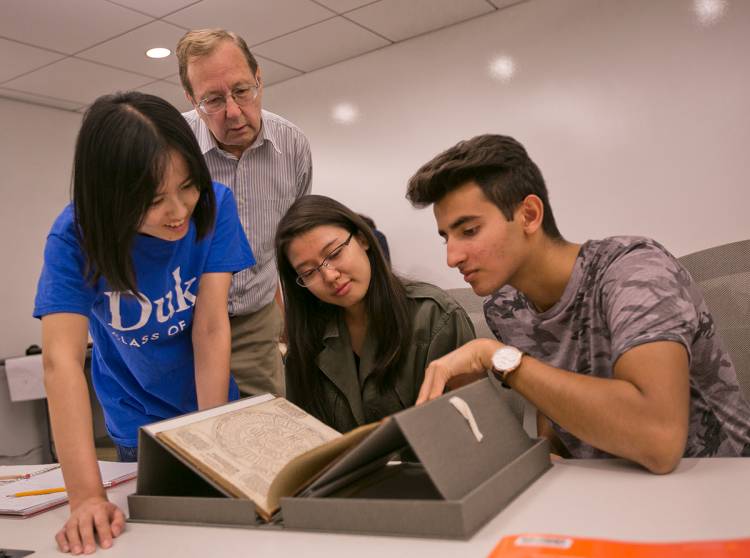Two Decades Later, FOCUS Remains a Staple of Duke's First-Year Program
Students respond to combination of multi-disciplinary seminars, residential learning and field trips

Before DukeEngage, before Duke Immerse, before Bass Connections and other programs of the past decade that have built the university’s reputation for innovative undergraduate education, there was FOCUS.
After 25 years, the multi-course seminar curriculum for first-year students is the “old man” of Duke interdisciplinary undergraduate programs. It’s going strong this fall with 360 students enrolled in 13 clusters.
This year, the university’s strategic plan, “Together Duke: Advancing Excellence Through Community,” pledged to expand the program and praised it for “engaging the intellectual interests of first-year students and for forging deep and lasting relationships among students and faculty.”
“The formula that makes FOCUS successful today is the same formula that first made it popular two decades ago,” said FOCUS director Edna Andrews. “It’s the combination of seminar setting, first-year students doing original research using original documents, a multidisciplinary approach to important, challenging topics, residential learning and learning outside classroom. FOCUS classes can do what nobody else does with first-year students, not just at Duke, but in the country.”
 FOCUS’ distinctive formula is attracting attention from educators around the country, including noted Harvard education professor Howard Gardner. Each FOCUS cluster offers a combination of three to four classes linked by a theme, taught by professors in a variety of disciplines. The students meet in seminars but also hold weekly dinners with faculty members. All students in a cluster live in the same residential hall.
FOCUS’ distinctive formula is attracting attention from educators around the country, including noted Harvard education professor Howard Gardner. Each FOCUS cluster offers a combination of three to four classes linked by a theme, taught by professors in a variety of disciplines. The students meet in seminars but also hold weekly dinners with faculty members. All students in a cluster live in the same residential hall.
The residential learning element is crucial, said Andrews, the Nancy & Jeffrey Marcus Professor. In addition to directing the program, Andrews teaches a course in the Cognitive Neuroscience and Law cluster.
“For one, it’s a luxury for a faculty member to be able to go to a single commons room for a mid-term study session and have everyone right there,” Andrews said. “Our vision isn’t to wall off FOCUS students. They get to be with friends not in FOCUS, but their FOCUS classmates are always nearby for continuing discussions.”
Program growth has been limited by costs – the multiple-seminar clusters are expensive -- and time challenges for faculty members. The strategic plan recommended additional university resources be used to overcome space and cost restrictions that currently limit enrollment. Andrews said she hopes the clusters can grow to 18-20 in the coming years, including more involvement from professional schools.
“I think it’s the best undergraduate education program in the country,” said political science professor Michael Gillespie, who has taught in the Visions of Freedom cluster since 1998. He currently teaches a political philosophy seminar on freedom and responsibility.
“It’s just so much fun teaching students this way,” he said. “These are freshmen, and they haven’t decided their major and their careers. They’re coming simply out of intellectual enthusiasm.”
The immediate close connection made between first-year students and teachers has benefits that continue past the semester, Gillespie added.
“Everything we know about higher education shows that it’s important for students to find a mentor to guide them through college and maintain their enthusiasm. With FOCUS, they have two or more mentors right off, faculty members that they’re seeing outside of the classroom at dinner every week and on field trips. I end up writing way more letters of recommendation than I would otherwise.”
 For math professor Anita Layton, teaching in the “What If? Explaining the Past/Predicting the Future” cluster not only gets her more engaged with student life, but it helps attract students to math who might otherwise avoid it.
For math professor Anita Layton, teaching in the “What If? Explaining the Past/Predicting the Future” cluster not only gets her more engaged with student life, but it helps attract students to math who might otherwise avoid it.
“For years I’ve been concerned about the lack of women among the math majors,” said Layton, who teaches a seminar on mathematical modeling in biology. “And I realized that introductory math courses can be interesting but dry. You learn the steps, but not the ‘why’ of the process. My unscientific experience is women want to know the ‘why.’
“With this FOCUS cluster, we built a new type of applied math course, one that showed the math and why we do it.”
The thread connecting all FOCUS courses is they demand a lot of the students. Layton’s class takes students of differing levels of mathematical understanding and challenges them with high-level problems, albeit presented in unusual ways. One questions students face is in a world filled with vampires, would human beings survive?
“It’s a way of looking at how competing species survive,” she said. “And it involves difficult math, but in part because they understand the application of it, the students are up to the challenge. I want them to learn math skills, take a real problem, learn how to ask precise questions in a scientific way, translate the answers into math and then translate the answers into real world solutions.”
The same holds true in humanities and social sciences classes. Gillespie’s students – which includes a number of foreign students from authoritarian regimes – bring fresh perspectives to classic political texts, and their differing experiences add to the discussions.
 Historian Thomas Robisheaux has taught in FOCUS for more than a decade. In the “Scientists, Artists and Merchants in Renaissance Europe” cluster, Robisheaux presents students with original documents from the period housed in the Rubenstein Library. In the presence of Da Vinci’s notebooks or the drawings of pioneering ecologist/artist Maria Sibylla Meriam, the students launch into the same questions about the origins of modern science that Robisheaux and his professional colleagues debate.
Historian Thomas Robisheaux has taught in FOCUS for more than a decade. In the “Scientists, Artists and Merchants in Renaissance Europe” cluster, Robisheaux presents students with original documents from the period housed in the Rubenstein Library. In the presence of Da Vinci’s notebooks or the drawings of pioneering ecologist/artist Maria Sibylla Meriam, the students launch into the same questions about the origins of modern science that Robisheaux and his professional colleagues debate.
It’s the best kind of teaching experience, Robisheaux said. Every year, as the semester progresses, he says the classroom discussion deepens as the students pick up more concepts and analytical abilities.
“I realized that I wasn’t expecting enough of students,” Robisheaux said. “I was selling them short. If you give them the materials and basic instruction in how you do research, and then encourage them, the students are capable of allowing a Da Vinci notebook speak to them and turn it into a research essay grounded in primary materials and original thinking.”
His class is part of the library’s Archives Alive program designed to bring primary materials from the library collections into the classroom. “Medieval and Renaissance Studies is such an abstraction to students,” he said. “Having a book printed in DaVinci’s lifetime that he may have known about, however, and may have even read is exciting to them. It helps them relate to the period, and the period becomes less remote.”
There’s evidence the seminars affect the students’ academic pathways. While some take courses in pre-existing interests, some are put on new, unexpected directions.
“The program is transformative,” Andrews said. “We have quantifiable evidence that the program shapes many students’ major decision, or leads to them adding a second major or a minor. Sometimes it sends them on a brand new intellectual trajectory; other times it takes them on an additional one.”
That spirit is what brings Andrews and other instructors back to the program.
“It’s a lot of work running the seminar, adding in the dinners and field trips,” Andrews said. “Every year, I know a lot of faculty think, ‘I don’t want to do it again,’ but the students are so wonderful and the learning environment is so exciting, nobody wants to walk away.”